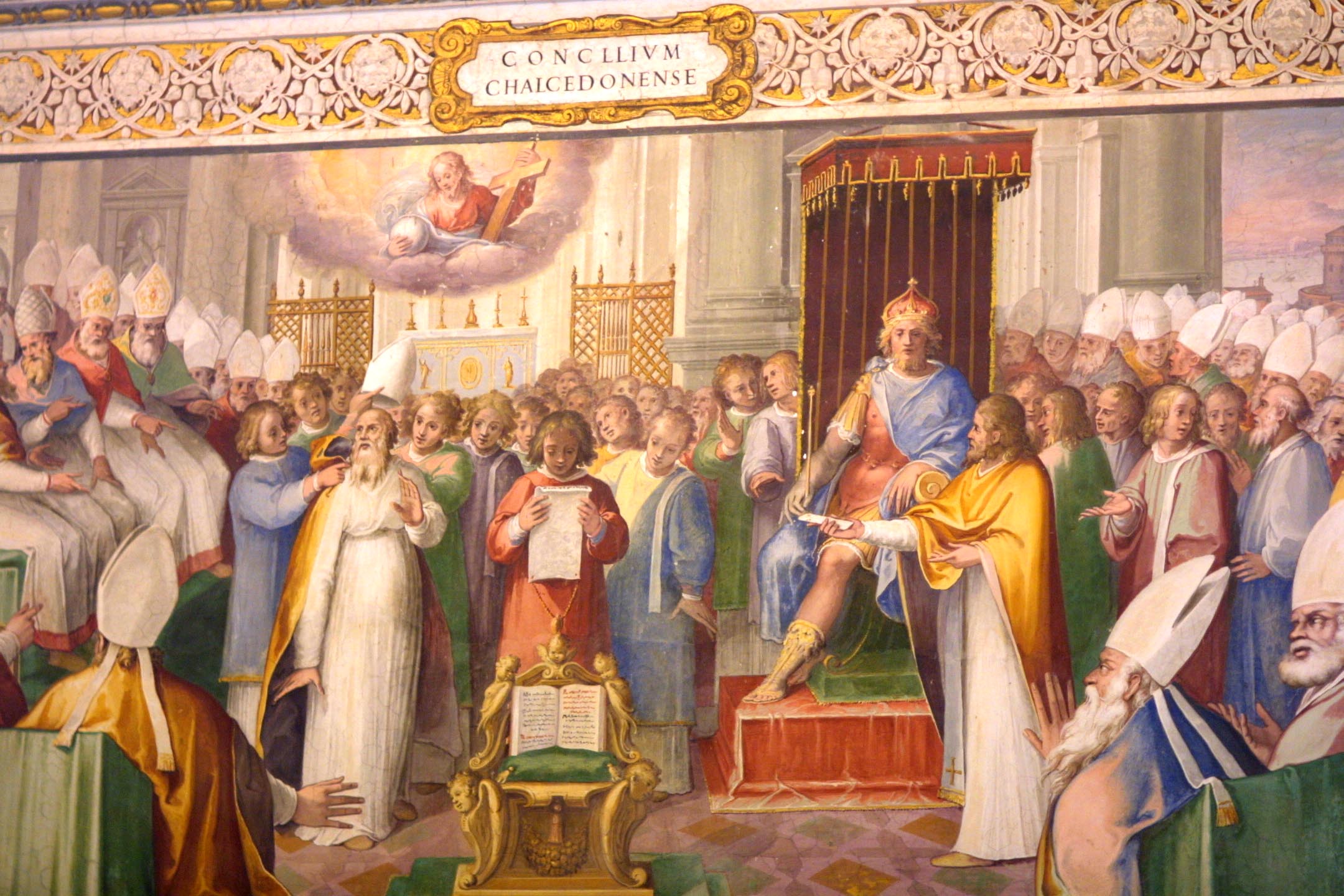The Creed of Chalcedon took place in 451. The council of Chalcedon met to discuss the false teaching of an archimandrite (senior priest of an Eastern Orthodox church) who claimed that the human nature of Jesus had dissolved into his divine nature. Basically they said Jesus was only divine and not human, which contradicted with the Nicene creed (beliefs of the church). There was an affirmaiton of the following Biblical law as part of the council.
Historical Background of The Council of Chalcedon
 |
| Council Chalcedon |
Biblical law is the foundation to the faith expressed at the council of Chalcedon. The Ten Commandments is a major institute of the creed.
It was the emperor Marcian who, after the "robber" council of Ephesus (449), commanded this council to meet. Pope Leo I was opposed to it. His view was that all the bishops should repent of their ways and individually sign his earlier dogmatic letter to Flavian, patriarch of Constantinople, and so avoid a new round of argument and debate. Moreover, the provinces of the West were being laid waste by Attila's invasions. But before the pope's view became known, the emperor Marcian had, by an edict of 17 May 451, convoked the council for 1 September 451. Although the pope was displeased, he sent legates: Paschasinus bishop of Lilybaeum, Bishop Lucentius, the priests Boniface and Basil, and Bishop Julian of Cos. No doubt Leo thought that the council would cause people to leave the church and go into schism. So he wanted it to be postponed for a time, and he implored the emperor that the faith handed down from ancient times should not become the subject of debate. The only business should be the restoration of the exiled bishops to their former positions.
The council was convoked at Nicaea but later transferred to Chalcedon, so as to be close to Constantinople and the emperor. It began on 8 October 451. The legates Paschasinus, Bishop Lucentius and the priest Boniface presided, while Julian of Cos sat among the bishops. By their side were the imperial commissars and those serving on the Senate, whose responsibility was simply to keep order in the council's deliberations.
The lists we have of those present are unsatisfactory. According to Leo there were 600 bishops at the council, whereas according to a letter to him there were 500.
The "Definition of the faith" was passed at the council's fifth session, and was solemnly promulgated at the sixth session in the presence of the emperor and the imperial authorities. The formula accepted in the decree is: Christ is one in two natures. This is in agreement with Leo's letter to Flavian of Constantinople, and Leo's letter is expressly mentioned in the Definition of the faith.
The council also issued 27 disciplinary canons (it is unclear at which session).
"Jesusis Lord"Creed of Chalcedon
We, then, following the holy Fathers, all with one consent, teach men to confess one and the same Son, our Lord Jesus Christ, the same perfect in Godhead and also perfect in manhood; truly God and truly man, of a reasonable [rational] soul and body; consubstantial [co-essential] with the Father according to the Godhead, and consubstantial with us according to the Manhood; in all things like unto us, without sin; begotten before all ages of the Father according to the Godhead, and in these latter days, for us and for our salvation, born of the Virgin Mary, the Mother of God, according to the Manhood; one and the same Christ, Son, Lord, Only begotten, to be acknowledged in two natures, inconfusedly, unchangeably, indivisibly, inseparably; the distinction of natures being by no means taken away by the unity, but rather the property of each nature being preserved, and concurring in one Person and one Subsistence, not parted or divided into two persons, but one and the same Son, and only begotten, God the Word, the Lord Jesus Christ; as the prophets from the beginning [have declared] concerning him, and the Lord Jesus Christ himself has taught us, and the Creed of the holy Fathers has handed down to us. Poem by Judge Roy Moore (JudgeRoy Moore Poem)
begotten before all ages of the Father according to the Godhead, and in these latter days, for us and for our salvation, born of the Virgin Mary, the Mother of God, according to the Manhood;one and the same Christ, Son, Lord, only begotten, to be acknowledged in two natures, inconfusedly, unchangeably, indivisibly, inseparably;the distinction of natures being by no means taken away by the union, but rather the property of each nature being preserved, and concurring in one Person and one Subsistence, not parted or divided into two persons, but one and the same Son, and only begotten, God the Word, the Lord Jesus Christ;as the prophets from the beginning [have declared] concerning Him, and the Lord Jesus Christ Himself has taught us, and the Creed of the holy Fathers has handed down to us.
The Chalcedon:
The Nicene Creed:
The Foundation of Chalcedon bring you these weekly Bible magazine verses on moral law:
Genesis 37:12-15
Joseph Sold by His Brothers
12 Then his brothers went to feed their father's flock in Shechem.
13 And Israel said to Joseph, "Are not your brothers feeding the flock in Shechem? Come, I will send you to them." So he said to him, "Here I am."
14 Then he said to him, "Please go and see if it is well with your brothers and well with the flocks, and bring back word to me." So he sent him out of the Valley of Hebron, and he went to Shechem.
15 Now a certain man found him, and there he was, wandering in the field. And the man asked him, saying, "What are you seeking?"